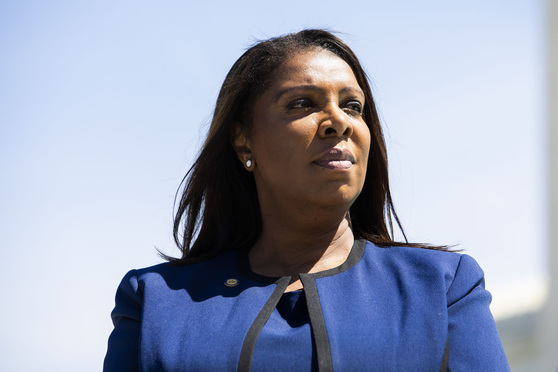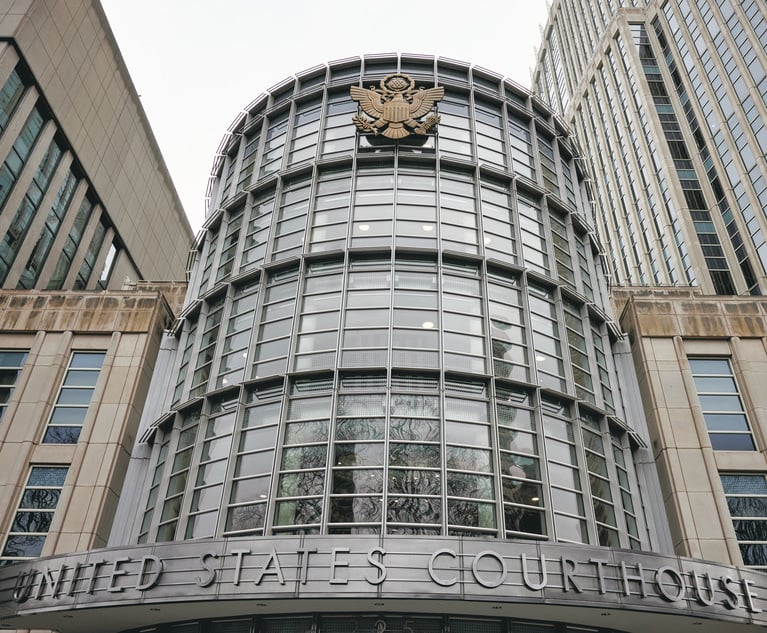'Will Discourage Victims From Stepping Forward': AG James on Campus Sexual Misconduct Regulations
The Trump administration's new regulations "gut[] decades of firmly established policy on schools' obligations to respond to sexual harassment and ... invent[] new rights for individuals accused of sexual harassment," state Attorney General Letitia James and six of her colleagues say in their 78-page complaint.
June 08, 2020 at 01:00 PM
6 minute read
 New York State Attorney General Letitia James. Photo: Diego M. Radzinschi/ALM
New York State Attorney General Letitia James. Photo: Diego M. Radzinschi/ALM
In a recent lawsuit against the Trump administration over the issue of how sexual misconduct should be defined and enforced on college campuses, New York Attorney General Letitia James is challenging new federal regulations that increase rights for accused students. The regulations do so, in part, by allowing schools to use a harder-to-meet standard of proof in order to establish culpability: Clear and convincing evidence of a student's misconduct as opposed to a preponderance of the evidence.
New York state has lodged its own lawsuit, separate and apart from an 18-state coalition, controlled by Democrat governors, that launched a very similar federal suit in Washington, D.C., on Thursday. New York's decision to act alone appears to represent, at least in part, the gravity with which James and her colleagues view the now-final regulatory overhaul of Title IX of the Education Amendments of 1972. The sweeping changes reportedly represent the achievement of a key policy goal for the Trump administration and its education secretary, Betsy DeVos.
DeVos has labeled as "kangaroo courts" some of the sexual-misconduct adjudicatory processes used by schools in recent years to determine the fate of accused students, according to news reports. Meanwhile, her department's press secretary, Angela Morabito, said this week of the regulations' increased procedural and evidentiary rights, such as making cross-examinations a mandatory part of adjudications and the option, though not the requirement, for schools to use a "clear and convincing" evidentiary standard: "Due process rights are survivors' rights—everyone deserves to be treated fairly, and that's what our [regulatory] rule requires."
In the Attorney General's Office complaint's second paragraph, James and her colleagues, who lodged their action in Manhattan federal court, summarize the range of harm they believe will be wrought by the revamp of Title IX.
"The [new] Final Rule guts decades of firmly established policy on schools' obligations to respond to sexual harassment and other forms of sex discrimination; strips existing protections for students and others targeted for and victimized by sexual harassment; invents new rights for individuals accused of sexual harassment that find no basis in the letter or spirit of Title IX; and imposes onerous new procedural requirements on educational institutions, in the midst of the COVID-19 global pandemic," the office wrote in a complaint that includes the names of seven office attorneys who worked on the filing.
The Attorney General's Office further alleges that the changes "redefine" what "sexual harassment" is at schools and college campuses—the new definition uses the U.S. Supreme Court's definition of "unwelcome conduct that is so severe, pervasive and objectively offensive," according to news reports—and the office contends that the changes "severely" narrow "schools' obligations to investigate and respond to harassing conduct" by lessening the chances that an institution can be found legally responsible for failed efforts to do so.
The Trump administration's regulations also lay out an "unduly prescriptive and burdensome" adjudicatory process for alleged victims, the New York state complaint said. In addition, it said, a "slew of highly prescriptive, burdensome grievance procedures" are part of the regulations, and they "will discourage victims from stepping forward."
In a news release Friday announcing the state's lawsuit, James said President Donald Trump "has repeatedly shown that he doesn't think sexual harassment is a serious matter, but his callousness now threatens our youngest and most vulnerable."
"Secretary DeVos and the Trump Administration are doing everything in their power to endanger and silence survivors of sexual harassment and assault," she added.
The varying adjudicatory processes used in recent years on college campuses for students accused of sexual misconduct ranging from harassment or minor assault to rape have evoked both loud support for, and public criticism of, how Title IX—a law that bars sex discrimination in programs getting federal funding—is used today.
Some school-based sexual assault cases have gained national headlines, both because of people's outrage at the accused student not being held responsible or punished harshly, and because some believe many school adjudicatory processes fail to approach evidentiary and presumption-of-innocence standards found in courtrooms.
Additionally, then-President Barack Obama put out guidance during his administration saying educational institutions must bolster sex misconduct investigations, and some critics have said that schools in turn grew to favor victims' allegations too heavily, news reports say.
Among the most pointed changes to the adjudicatory process for alleged student victims and the accused under DeVos' final rule is the cross-examination requirement. In draft form, the regulatory changes, according to a recent New York Times report, included the notion of students questioning each other. But DeVos' department, the report said, which was flooded with more than 100,000 comments during a proposed-rule comment period, ended up dropping that idea, and now, under the final rule, cross-examinations will be handled by attorneys and other types of advisers.
Other changes instituted by the final rule include limiting the scope of what an institution must police, so that some off-campus activity is no longer its responsibility, according to the report on regulations that span more than 2,000 pages. Plus, accused students must be told in writing that they're presumed innocent.
James' office, in the news release, said that the regulatory changes, which are set to take effect in August, will "limit the protections against sexual harassment for the more than 50 million students enrolled in kindergarten through 12th grade in the United States and the approximately 20 million students enrolled in colleges and universities across the nation."
James also said U.S. Justice Department statistics show that "only 20 percent of female students aged 18 to 24 who experienced sexual violence ever reported this conduct, but the final rule will further exacerbate this reality."
The federal education department press secretary, Morabito, who could not be reached for comment for this report, declined to address the 18-state coalition-filed lawsuit directly this week, said a New Jersey Law Journal article. But Morabito said that the new Title IX rules protect all students by requiring schools to follow a reliable, transparent, and fair process in handling complaints of sexual misconduct, the report noted.
New York state's 78-page complaint brings four claims for relief under the Administrative Procedure Act, including one contending that the education department and DeVos "exceed[ed] statutory authority" and saying the regulatory changes are "arbitrary and capricious." Among other relief, the suit asks for an enjoinment of the education department from "implementing, applying, or taking any action" in regard to the May 19 published final rule.
This content has been archived. It is available through our partners, LexisNexis® and Bloomberg Law.
To view this content, please continue to their sites.
Not a Lexis Subscriber?
Subscribe Now
Not a Bloomberg Law Subscriber?
Subscribe Now
NOT FOR REPRINT
© 2025 ALM Global, LLC, All Rights Reserved. Request academic re-use from www.copyright.com. All other uses, submit a request to [email protected]. For more information visit Asset & Logo Licensing.
You Might Like
View All
The Met Hires GC of Elite University as Next Legal Chief

NY Appellate Panel Cites Student's Disciplinary History While Sending Negligence Claim Against School District to Trial

'No Evidence'?: Big Law Firms Defend Academic Publishers in EDNY Antitrust Case
3 minute read
'Substantive Deficiencies': Judge Grants Big Law Motion Dismissing Ivy League Price-Fixing Claims
3 minute readTrending Stories
- 1RIP DOJ FCPA Corporate Prosecutions
- 2Federal Trade Commission’s Updates to the Health Breach Notification Rule Now In Effect
- 3I’m A Lawyer, What Can I Sell?
- 4Internal GC Hires Rebounded in '24, but Companies Still Drawn to Outside Candidates
- 5How I Made Office Managing Partner: 'Don’t Be an Opportunity Killer,' Says Thomas Haskins of Barnes & Thornburg
Who Got The Work
J. Brugh Lower of Gibbons has entered an appearance for industrial equipment supplier Devco Corporation in a pending trademark infringement lawsuit. The suit, accusing the defendant of selling knock-off Graco products, was filed Dec. 18 in New Jersey District Court by Rivkin Radler on behalf of Graco Inc. and Graco Minnesota. The case, assigned to U.S. District Judge Zahid N. Quraishi, is 3:24-cv-11294, Graco Inc. et al v. Devco Corporation.
Who Got The Work
Rebecca Maller-Stein and Kent A. Yalowitz of Arnold & Porter Kaye Scholer have entered their appearances for Hanaco Venture Capital and its executives, Lior Prosor and David Frankel, in a pending securities lawsuit. The action, filed on Dec. 24 in New York Southern District Court by Zell, Aron & Co. on behalf of Goldeneye Advisors, accuses the defendants of negligently and fraudulently managing the plaintiff's $1 million investment. The case, assigned to U.S. District Judge Vernon S. Broderick, is 1:24-cv-09918, Goldeneye Advisors, LLC v. Hanaco Venture Capital, Ltd. et al.
Who Got The Work
Attorneys from A&O Shearman has stepped in as defense counsel for Toronto-Dominion Bank and other defendants in a pending securities class action. The suit, filed Dec. 11 in New York Southern District Court by Bleichmar Fonti & Auld, accuses the defendants of concealing the bank's 'pervasive' deficiencies in regards to its compliance with the Bank Secrecy Act and the quality of its anti-money laundering controls. The case, assigned to U.S. District Judge Arun Subramanian, is 1:24-cv-09445, Gonzalez v. The Toronto-Dominion Bank et al.
Who Got The Work
Crown Castle International, a Pennsylvania company providing shared communications infrastructure, has turned to Luke D. Wolf of Gordon Rees Scully Mansukhani to fend off a pending breach-of-contract lawsuit. The court action, filed Nov. 25 in Michigan Eastern District Court by Hooper Hathaway PC on behalf of The Town Residences LLC, accuses Crown Castle of failing to transfer approximately $30,000 in utility payments from T-Mobile in breach of a roof-top lease and assignment agreement. The case, assigned to U.S. District Judge Susan K. Declercq, is 2:24-cv-13131, The Town Residences LLC v. T-Mobile US, Inc. et al.
Who Got The Work
Wilfred P. Coronato and Daniel M. Schwartz of McCarter & English have stepped in as defense counsel to Electrolux Home Products Inc. in a pending product liability lawsuit. The court action, filed Nov. 26 in New York Eastern District Court by Poulos Lopiccolo PC and Nagel Rice LLP on behalf of David Stern, alleges that the defendant's refrigerators’ drawers and shelving repeatedly break and fall apart within months after purchase. The case, assigned to U.S. District Judge Joan M. Azrack, is 2:24-cv-08204, Stern v. Electrolux Home Products, Inc.
Featured Firms
Law Offices of Gary Martin Hays & Associates, P.C.
(470) 294-1674
Law Offices of Mark E. Salomone
(857) 444-6468
Smith & Hassler
(713) 739-1250






